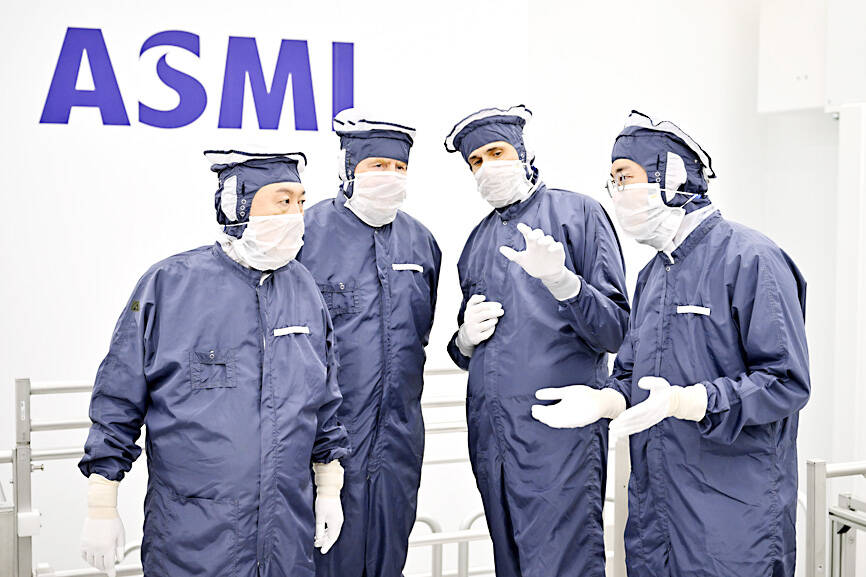ASML Holding NV and Samsung Electronics Co are to jointly spend 1 trillion won (US$760 million) to build a South Korean plant to develop cutting-edge semiconductor processing technology.
The plant is to use next-generation extreme ultraviolet equipment technology, available exclusively via ASML, that is used to produce high-end chips, the Veldhoven, Netherlands-based company said in a statement on Tuesday.
The new plant expands ASML’s presence in South Korea, where it already has four sites serving customers including Samsung. Geographic diversity is increasingly important with ASML and its unique technology at the center of a trade dispute between the US and China.

Photo: EPA-EFE
South Korean President Yoon Suk-yeol visited ASML’s headquarters with Dutch King Willem-Alexander on Tuesday to see the production of next-generation extreme ultraviolet lithography machines, a statement from the South Korean presidential office said.
Samsung executive chairman Jay Y. Lee and SK Group chairman Chey Tae-won also joined the tour, the statement said.
Yoon has sought to strengthen technology ties with the US and other nations more aligned with Washington since taking office last year. He has also called for more efforts for South Korea to build technology clusters on its own soil to refine and produce cutting-edge products from semiconductors to electric vehicles, as a buffer against rising global competition for tech dominance.
The two nations also announced plans to establish a “Korea-Netherlands Advanced Semiconductor Academy,” which would allow students and workers in South Korea to have education opportunities in the Netherlands.
ASML, which is facing a severe labor shortage, depends on foreign talent to expand its business.
ASML is the world’s top maker of lithography systems, machines that perform a crucial step in the process of creating semiconductors.
It is the world’s only source of extreme ultraviolet lithography machines used by Taiwan Semiconductor Manufacturing Co (台積電), Samsung and Intel Corp for the most advanced fabrication.

When an apartment comes up for rent in Germany’s big cities, hundreds of prospective tenants often queue down the street to view it, but the acute shortage of affordable housing is getting scant attention ahead of today’s snap general election. “Housing is one of the main problems for people, but nobody talks about it, nobody takes it seriously,” said Andreas Ibel, president of Build Europe, an association representing housing developers. Migration and the sluggish economy top the list of voters’ concerns, but analysts say housing policy fails to break through as returns on investment take time to register, making the

‘SILVER LINING’: Although the news caused TSMC to fall on the local market, an analyst said that as tariffs are not set to go into effect until April, there is still time for negotiations US President Donald Trump on Tuesday said that he would likely impose tariffs on semiconductor, automobile and pharmaceutical imports of about 25 percent, with an announcement coming as soon as April 2 in a move that would represent a dramatic widening of the US leader’s trade war. “I probably will tell you that on April 2, but it’ll be in the neighborhood of 25 percent,” Trump told reporters at his Mar-a-Lago club when asked about his plan for auto tariffs. Asked about similar levies on pharmaceutical drugs and semiconductors, the president said that “it’ll be 25 percent and higher, and it’ll

CHIP BOOM: Revenue for the semiconductor industry is set to reach US$1 trillion by 2032, opening up opportunities for the chip pacakging and testing company, it said ASE Technology Holding Co (日月光投控), the world’s largest provider of outsourced semiconductor assembly and test (OSAT) services, yesterday launched a new advanced manufacturing facility in Penang, Malaysia, aiming to meet growing demand for emerging technologies such as generative artificial intelligence (AI) applications. The US$300 million facility is a critical step in expanding ASE’s global footprint, offering an alternative for customers from the US, Europe, Japan, South Korea and China to assemble and test chips outside of Taiwan amid efforts to diversify supply chains. The plant, the company’s fifth in Malaysia, is part of a strategic expansion plan that would more than triple

Taiwanese artificial intelligence (AI) server makers are expected to make major investments in Texas in May after US President Donald Trump’s first 100 days in office and amid his rising tariff threats, Taiwan Electrical and Electronic Manufacturers’ Association (TEEMA, 台灣電子電機公會) chairman Richard Lee (李詩欽) said yesterday. The association led a delegation of seven AI server manufacturers to Washington, as well as the US states of California, Texas and New Mexico, to discuss land and tax issues, as Taiwanese firms speed up their production plans in the US with many of them seeing Texas as their top option for investment, Lee said. The